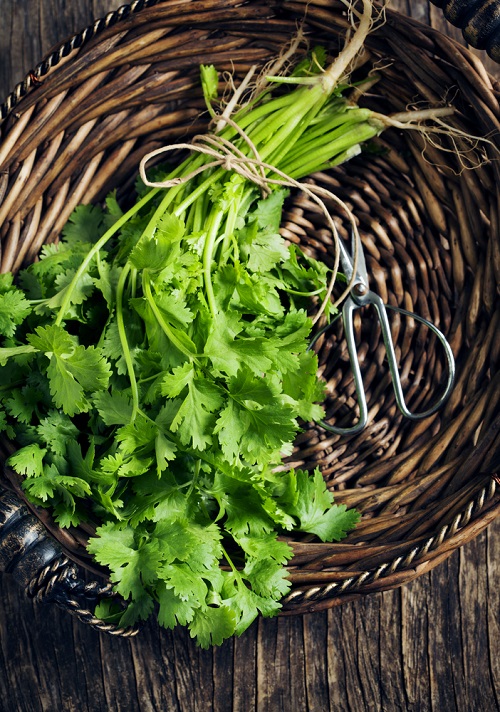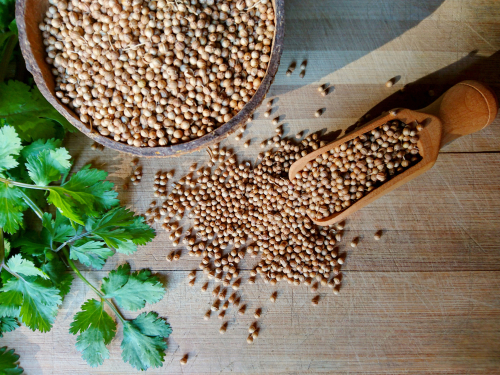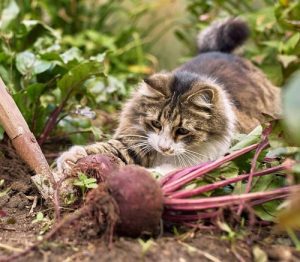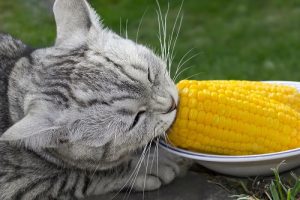Can Cats Eat Cilantro? Find out in our article whether this popular herb is safe or not for your feline friend.
Infamously known for poking their heads into plates they should stay away from, cats are notorious eaters. On the list of never-ending questions about what they can eat and not, today’s question is – Can Cats Eat Cilantro?
In this article, we will explore the effects of cilantro on cats and provide recommendations for how to introduce the herb into their diet safely.
Can Cats Eat Kale? Find out here
What Is Cilantro?

Cilantro, also known as coriander, is an aromatic herb with a distinctive, flavorful taste that is used in many cuisines worldwide. It is an annual herb from the parsley family and has a light, citrusy flavor. All parts of this plant are edible and can be used fresh or dried, e.g., leaves, stems, and seeds. The strong flavor of cilantro is used as an ingredient in cooking, and its bright green color is used for garnishing.
Cilantro is popularly used in sauces, dips, salads, and salsas. It is a beneficial herb with antifungal and antibacterial properties and some essential nutrients.
Can Cats Eat Cilantro?
Cilantro is a popular herb that is used in a variety of dishes, but can cats eat it? The answer is not a simple yes or no. If fed in small amounts, this herb can provide some nutrition to felines. As a drawback, too much of it can cause digestive issues.
Cilantro is not essential to the feline diet since cats are obligate carnivores. So, cats do not necessarily need to eat this herb, but they can have it occasionally if they like its flavor.
Is Cilantro Toxic For Cats?
Cats and cilantro make an unlikely combination but one that many cat owners have asked about. Cilantro is not toxic for cats, but only if fed moderately and with care.
Cilantro contains essential oils and compounds that can cause gastrointestinal irritation and other side effects, such as vomiting and diarrhea. So while it is not necessarily dangerous to share a few leaves with your cat, it is best to refrain from feeding this herb to cats regularly.
Does Cilantro Contain Any Nutritional Value For Cats?

If eaten in the right amount, cilantro can help cats with its wide variety of nutritional content.
- Vitamins: Cilantro contains essential vitamins like vitamins A, B vitamins, vitamin K (beneficial for bone health), vitamin C, and potassium.
- Minerals: Cilantro contains essential minerals like calcium, phosphorus, iron, magnesium, manganese, and zinc.
- Dietary fiber: Cilantro can help cats with hairballs and support a healthy digestive system due to its high dietary fiber content.
- Fatty acids: The essential fatty acids in cilantro promote healthy skin and coat.
- Antioxidants: Cilantro has many antioxidants, which help protect cats from free radical damage that can lead to cancer and other diseases, reduce inflammation, and help to protect their cells from damage.
- Antibacterial properties: Cilantro can help cats with bad breath, act as a natural de-wormer due to its high levels of sulfur compounds, and is used as a natural flea repellent, as its strong smell can help to keep pests away.
- The volatile oils in cilantro can help to reduce inflammation and boost the immune system.
How To Feed Cilantro To Cats?
- Ensure that the cilantro is of high quality, as cats can be sensitive to pesticides or other contaminants.
- Wash the fresh cilantro leaves and make sure they are free of any dirt or debris.
- Chop the leaves into small pieces.
- Offer small amounts of fresh cilantro as a treat.
- Sprinkle the chopped cilantro leaves onto your cat’s food.
- Monitor your cat closely to make sure they are not having any adverse reactions to the herb.
Can Cats Eat Cilantro? A Few Concerns
- Cats have sensitive digestive systems, and cilantro can be an irritant. It can cause stomach upset, diarrhea, and vomiting.
- Cilantro should be avoided altogether if your cat has an existing digestive issue.
- Start with a small amount to determine if your cat has an allergic reaction like itching, sneezing, or vomiting.
Can Cats Eat Cilantro Seeds?

No, cats should not eat cilantro seeds as they can be a choking hazard for small feline throats. They can also cause severe digestive problems.
Can Cats Eat Cilantro? Something Important!
- It is best to consult your veterinarian before giving your cat cilantro for any medical issues.
- Cilantro is not a suitable replacement for a cat’s regular diet and may cause digestive issues.
- Make sure that the cilantro your cat is eating is free from pesticides and chemicals.
Can Cats Eat Cilantro? Quick Takeaways!
- So, Can Cats Eat Cilantro? Well, cats can eat fresh, chopped cilantro as an occasional treat.
- Cilantro provides nutrients like vitamins, minerals, fatty acids, antioxidants, and fiber to cats.
- Felines should be kept away from cilantro seeds as they can be choking and a health hazard.
- Although cats can eat cilantro, it should not be their primary source of nutrition.
- If you have any questions or concerns about feeding your cat cilantro, it is important to contact your veterinarian.



